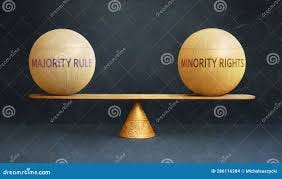The Lost Language of (Left) Majoritarianism
In search of a sounder basis for Democratic politics
For the last seventy years, the heart—and also the head—of American politics has been what might be termed minoritarianism: a belief that national society and politics should focus on those who had been traditionally relegated to the margins. First among equals in such minorities were of course racial. The Civil Rights movement was the defining issue of the 1950s and 60s. In its wake was the women’s movement (a minority that was in fact a majority), the struggle for gay rights, and then on into a panoply of movements centered on sex and gender, immigration, et. al. The power and appeal of these movements were such that even those Americans who opposed them adopted their language and tactics in opposing abortion and gun control, framing them as civil rights issues.
In some sense, the American left has maintained an unwavering focus on minoritarianism as a moral imperative. It went to the very notion of the meaning of progress: the expansion of attention on rights as the essence of the national experiment. This is understandable and honorable. But over time, this approach has had a growing cost. The most obvious has been political: growing resistance by those who were not included or felt threatened—whether rightly or not—by the social changes that resulted over time. This is how one got “the Forgotten Man” invoked by conservatives during the New Deal, the “Silent Majority” celebrated by Richard Nixon, and the “47 percent” cited by Mitt Romney of people who belong to the producing classes (a very old trope in American politics).
These changes of the last half-century have indeed been profound, even if they didn’t always realize the fondest hopes of their proponents. One didn’t have to be a bigot to be unsettled by them, even if one had an obligation to adjust, whether as a matter of personal growth or a matter of conformity, which, however onerous it can sometimes be, is the price of (an evolving) civilized society.
Minoritianism has other costs as well. One is growing ambiguity on what constitutes minority status and on what basis (racial categories, for example, have always been fluid and continue to be such in a time of accelerating racial mixing). Another involves losing sight of the claims, moral and otherwise, of majorities. The most obvious example of this is in the realm of economics: (working) class is mass. Yet this category has perceptibly receded in our national discourse. It is typically referred to in cultural or symbolic terms, which makes some sense but is also, in some sense, a distraction. The Democratic Party has steadily lost ground with the American working class—first the white working class, and increasingly among people of color. But this migration toward Republicans has not really been met with a serious effort to appeal to working people in anything but symbolic terms because the GOP has been reluctant to retreat from its historic commitment to business and financial interests.
One important way to understand the appeal of Donald Trump is as the head of a majoritarian movement—even if he has yet to demonstrate electoral majority support. He nevertheless does command an important demographic plurality. Certainly, this is how his supporters understand themselves. (One telling and effective Trump ad contrasts him with Kamala Harris this way: “She cares about they/them. He cares about you.”) For those saturated in a minoritarian ethos, Trump’s bid for majoritarianism is at best troubling and at worst horrifying. It represents a refutation of all they hold dear.
And indeed one can and should be appalled by much of what one sees and hears in the Trump coalition. But the best response is a renewed effort to identify, crystallize, and appeal to what might be termed legitimate majorities that can command support, loyalty, and moral authority. The antislavery drive of the early Republican Party was conducted on a majoritarian basis, waged against a proslavery elite. So was the New Deal. The most successful Democratic politicians of the last thirty years, Bill Clinton and Barack Obama, crafted their programs on such a basis. A current Harris commercial that Trump only cares about himself and she cares about us is a good move in this direction. Our last best hope rests with this tradition, one that affirms common ground rather than emphasizing or celebrating difference.



